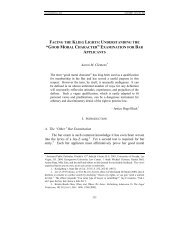The Science and Statistics Behind Spanking Suggests that
The Science and Statistics Behind Spanking Suggests that
The Science and Statistics Behind Spanking Suggests that
Create successful ePaper yourself
Turn your PDF publications into a flip-book with our unique Google optimized e-Paper software.
11-FULLER_FINAL_AFTERPROOF.DOC 2/17/2009 8:50 AM<br />
2009] THE SCIENCE AND STATISTICS BEHIND SPANKING 299<br />
It took five police officers to get the fifteen-year-old boy in h<strong>and</strong>cuffs<br />
<strong>and</strong> [into] a police car. [After he had been taken away, an officer]<br />
interviewed the mother to determine why the boy had become so<br />
violent. <strong>The</strong> mother [said she <strong>and</strong> the father] had simply tried to<br />
restrain the boy from leaving the house after curfew. [In defiance, the<br />
boy] proceeded to punch the daylights out of both mom <strong>and</strong> dad. Mom<br />
explained <strong>that</strong> they had lost control of the boy at an early age, as young<br />
as three or four years old. He simply refused to do what they said.<br />
“We’ve tried everything,” she sobbed. “We’ve tried timeouts, we’ve<br />
tried grounding him, we’ve taken privileges away, it just seems like<br />
nothing works.” [<strong>The</strong> officer] then asked . . . “When he was three<br />
years old <strong>and</strong> refused to do what you said, did you ever spank him?”<br />
Mom became very angry as her eyes narrowed to slits <strong>and</strong> she gritted<br />
her teeth. With blood running down her face from a broken nose, she<br />
replied, “We don’t believe in spanking. Violence begets violence!” 300<br />
This is the sad result of a mother who obviously cared about her<br />
child, but never learned <strong>that</strong> aggression <strong>and</strong> delinquency are related to<br />
the quality of parenting, not the use of physical discipline. 301 Other<br />
parents seldom learn <strong>that</strong> aggression is more closely linked to<br />
permissiveness, negative criticism, <strong>and</strong> watching television than to even<br />
abusive physical punishment. 302 Still others rarely learn things like,<br />
seven-year-olds, in African-Americans, <strong>and</strong> in girls); Detective Robert Surgenor, Introduction to<br />
Fighting Back, available at http://www.fdno.org/articles/introduction.html (saying <strong>that</strong> the youth in<br />
the following story, who was never spanked, was in trouble with the police “on a daily basis”).<br />
300. Surgenor, supra note 299.<br />
301. See, e.g., Baumrind, Causally Relevant Research, supra note 21, at 14 (“[V]ariations in<br />
the complex pattern of childrearing, not whether parents include normative physical punishment<br />
among their disciplinary options, accounts for the significant differences in child outcomes.”);<br />
Ronald L. Simons, Christine Johnson & R<strong>and</strong> D. Conger, Harsh Corporal Punishment Versus<br />
Quality of Parental Involvement as an Explanation of Adolescent Maladjustment, 56 J. MARRIAGE<br />
& FAM. 591 (1994) (finding <strong>that</strong> once the contribution of parental involvement had been removed,<br />
harsh corporal punishment showed no detrimental impact on adolescent aggressiveness,<br />
delinquency, <strong>and</strong> dysphoria).<br />
302. Compare UNDERSTANDING AND PREVENTING VIOLENCE 371 (A.J. Reiss & J.A. Roth<br />
eds., 1993) (reviewing 188 studies from 1957-1990 <strong>and</strong> concluding: “Overall, the vast majority of<br />
studies, whatever their methodology, showed <strong>that</strong> exposure to television violence resulted in<br />
increased aggressive behavior, both contemporaneously <strong>and</strong> over time.”), with, e.g., Larzelere,<br />
Meta-Analysis, supra note 15, at 24 (reviewing twenty-six qualifying studies <strong>and</strong> finding <strong>that</strong> even<br />
severe or predominant physical discipline consistently is more beneficial than other disciplinary<br />
tactics to reduce aggression), <strong>and</strong> Dan Olweus, Familial <strong>and</strong> Temperamental Determinants of<br />
Aggressive Behavior in Adolescent Boys, 16 DEV. PSYCH. 644 (1980) (saying maternal<br />
permissiveness <strong>and</strong> negative criticism leads to more detrimental effects than even abusive physical<br />
discipline).

















